From Farm to Bottle: This Brewery Combines Beer and Agriculture
Will British Columbia’s craft beer craze spur a hop-growing renaissance?
From Farm to Bottle: This Brewery Combines Beer and Agriculture
Will British Columbia’s craft beer craze spur a hop-growing renaissance?
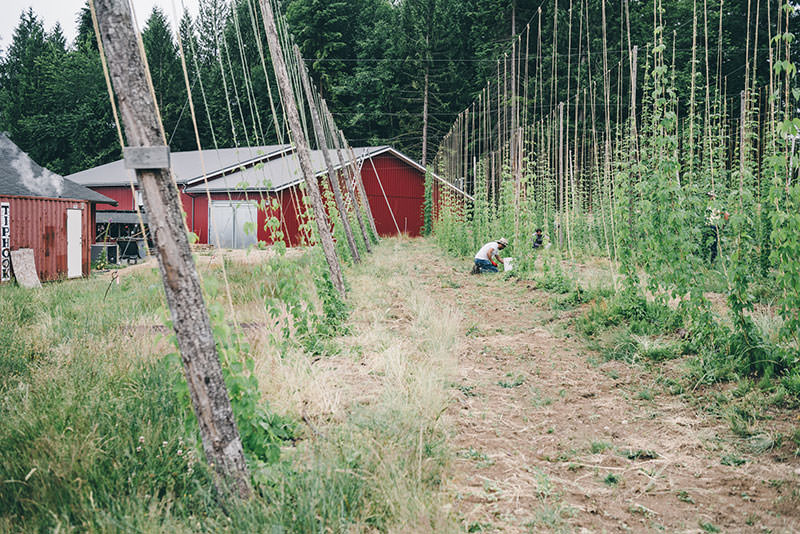
Persephone’s 11-acre plot is home to its craft micro-brewery and tasting room hidden inside a red barn-like building. Outside, hens poke around in their pen. An Airstream trailer that doubles as Farm to Feast‘s food truck is parked in front of a pizza oven. On a stretch of land just steps away, spindly wooden poles are interlaced with zig-zagging cables and hundreds of feet of twine, like some new-age string art project. This is one of two hop yards on the farm.
The chickens, hop yards, and building are all part of the farm brewery and certified B Corp that Brian Smith and Mark Brand co-founded in 2012. The pair had collaborated on other business ventures before starting Persephone, named for the log-salvage boat from The Beachcombers, one of Canada’s longest-running TV shows, which was filmed in Gibsons. That, and the goddess of spring bounty, who is working her magic on this unseasonably warm April day.
Come summer, the tender shoots that wriggle up the twine trellises will grow thick and later produce the sticky cone-shaped flowers that give beer its bitter balance and aromas and flavors.
“Cascade, Centennial and Goldings are in this upper yard. Down below, it will be mostly Cascade, Centennial and Chinook,” says Smith, pointing to a five-acre plot that will be planted with 4,000 hop rhizomes in early May. The plants will reach maturity in four years. The Goldings and “Big C” hop varietals, which are widely used in Pacific Northwest ales, were chosen by head brewer, Anders McKinnon, to create Persephone’s hoppy beers.
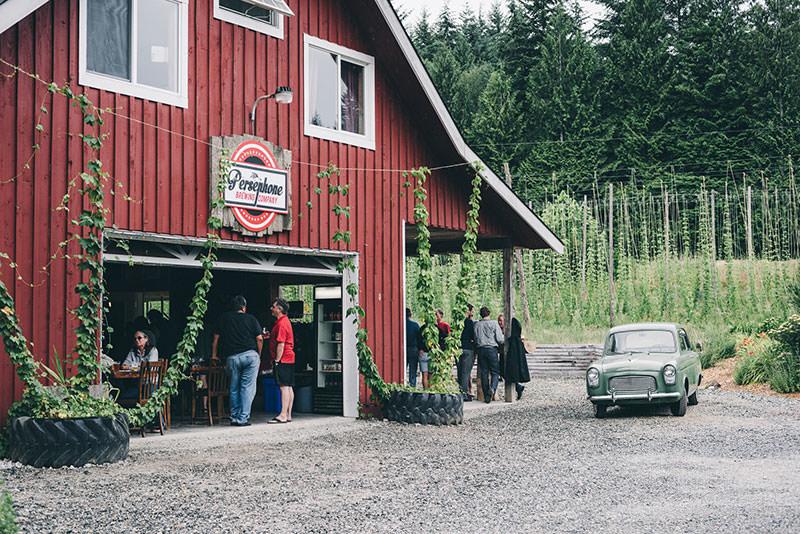
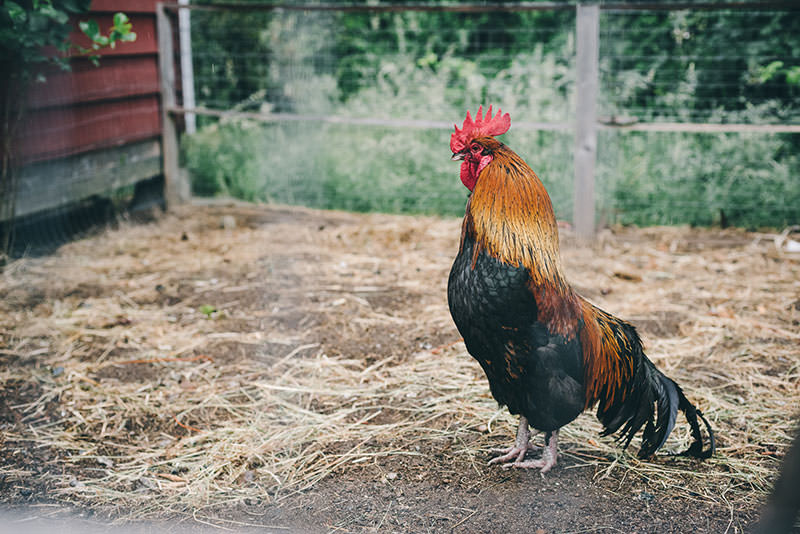
A handful of breweries in Canada grow hops, in addition to using others grown in the U.S. and beyond. Persephone’s farm-to-bottle operation, however, is also a social enterprise owned by 45 individuals and organizations, including the Sunshine Coast Association for Community Living (SCACL), which provides services for people with developmental disabilities – many of whom work at Persephone.
“Neither of us were farmers,” says Smith, who also works in economic development. Brand is a longtime restaurateur and barman. The serial entrepreneurs had successfully teamed up on social ventures in the past to bring food security to people living in Vancouver’s Downtown Eastside – arguably Canada’s poorest neighborhood.
“Both of us had a very sincere and intimate connection to the idea of local food … and trying to figure out how small farms and locally grown food can become viable for us as consumers and our planet,” says Smith.
He and Brand wanted to connect the brewery business model to an agricultural model from the start. They brought Dion Whyte, Persephone’s general manager and second employee (McKinnon was the first) on board in May 2013.
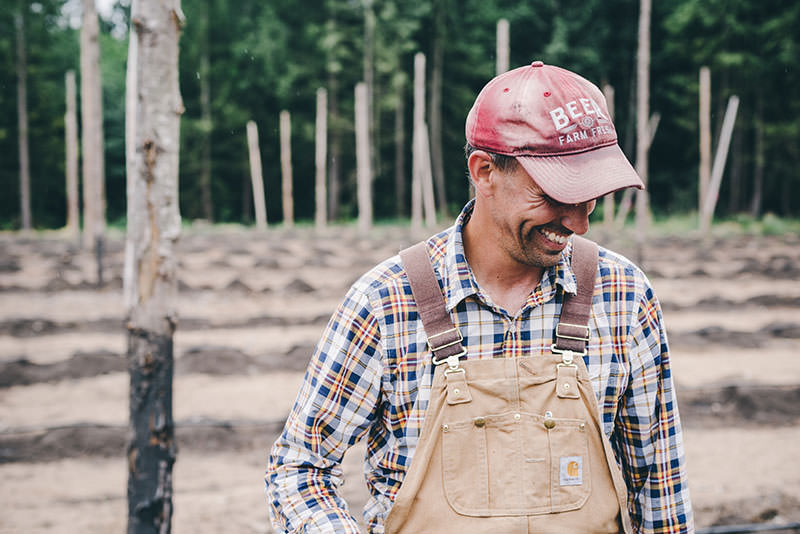
Whyte had already formed an organization of hop growers called the Hop Yard Collective, with the goal to produce enough hops to support British Columbia’s booming craft beer market. With the help of another staff member, he designed and built Persephone’s hop yard on the land that was once a flower farm. The entire Persephone team, clients from SCACL, and community volunteers planted the first crop of hops.
Farming, however, isn’t exactly flourishing on the Sunshine Coast. Just 11 to 13 percent of the 9,600 acres in the region’s Agricultural Land Reserve is actively being farmed.
Persephone hopes to help change that. It has received a grant from the B.C. Investment Agriculture Foundation “to do a study to see whether [growing] hops is feasible in this day and age, given what’s happening with craft beer in the province,” says Whyte.
The funding also provides for education and outreach, like the one-day crash course in hop-farming Whyte led in early April. He covered everything from theory to getting dirty in the demo hop yard stringing twine and top-dressing the soil. He plans to lead future workshops and make the working hop yard more interactive.
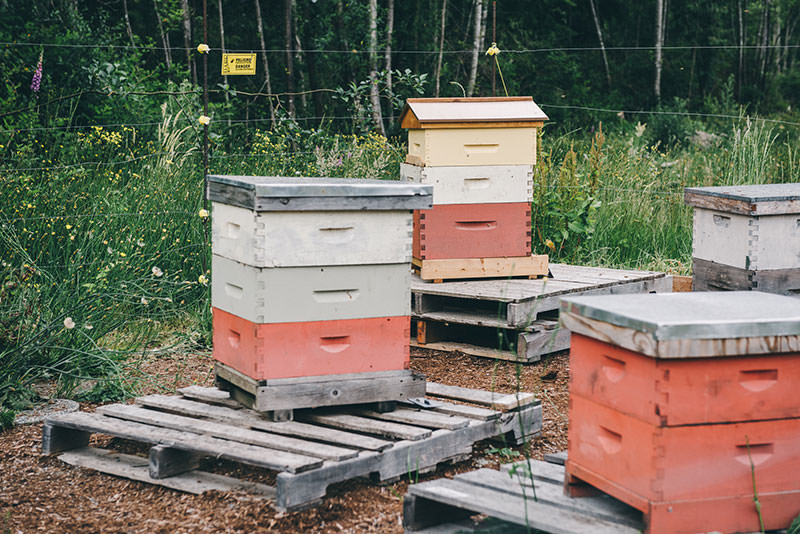
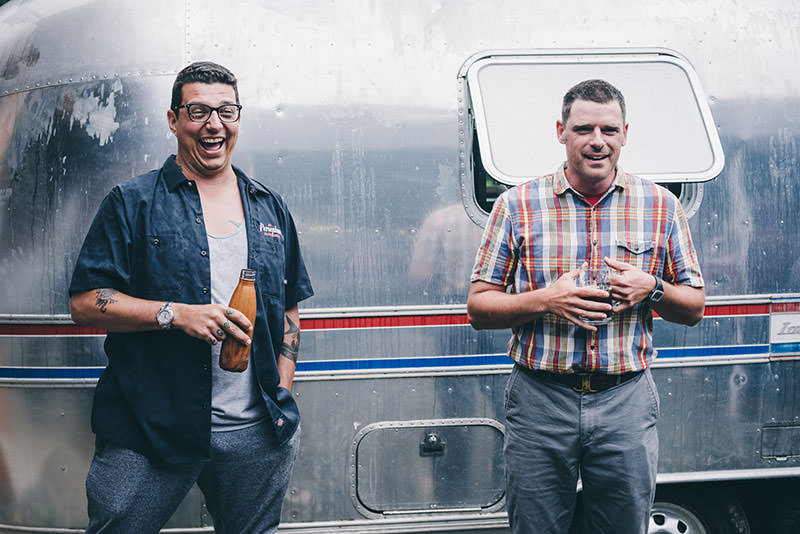
“We’re working on some interpretative signage so people can do self-guided tours and get a little information about hop growing, from both the operational and business sides,” Whyte adds.
Part of Persephone’s business model included getting B Corp certification in 2015 by meeting strict standards in areas such as environmental and social performance. Getting certification was “second nature” says Smith, who credits Brand’s leadership in this area.
“Our spent grain that comes out of the brew house gets mixed with mulch and becomes compost, which then amends our soil, which grows the hops that go back into the brewery,” Smith says, describing how wastewater is captured and remediated to irrigate food crops like the tomatoes that top the pizza churned out on-site.
“We can create whole farms systems that I think model what can be healthy ecological systems and healthy community.”
Follow us
This work is licensed under a Creative Commons Attribution-NoDerivatives 4.0 International License.
Want to republish a Modern Farmer story?
We are happy for Modern Farmer stories to be shared, and encourage you to republish our articles for your audience. When doing so, we ask that you follow these guidelines:
Please credit us and our writers
For the author byline, please use “Author Name, Modern Farmer.” At the top of our stories, if on the web, please include this text and link: “This story was originally published by Modern Farmer.”
Please make sure to include a link back to either our home page or the article URL.
At the bottom of the story, please include the following text:
“Modern Farmer is a nonprofit initiative dedicated to raising awareness and catalyzing action at the intersection of food, agriculture, and society. Read more at <link>Modern Farmer</link>.”
Use our widget
We’d like to be able to track our stories, so we ask that if you republish our content, you do so using our widget (located on the left hand side of the article). The HTML code has a built-in tracker that tells us the data and domain where the story was published, as well as view counts.
Check the image requirements
It’s your responsibility to confirm you're licensed to republish images in our articles. Some images, such as those from commercial providers, don't allow their images to be republished without permission or payment. Copyright terms are generally listed in the image caption and attribution. You are welcome to omit our images or substitute with your own. Charts and interactive graphics follow the same rules.
Don’t change too much. Or, ask us first.
Articles must be republished in their entirety. It’s okay to change references to time (“today” to “yesterday”) or location (“Iowa City, IA” to “here”). But please keep everything else the same.
If you feel strongly that a more material edit needs to be made, get in touch with us at [email protected]. We’re happy to discuss it with the original author, but we must have prior approval for changes before publication.
Special cases
Extracts. You may run the first few lines or paragraphs of the article and then say: “Read the full article at Modern Farmer” with a link back to the original article.
Quotes. You may quote authors provided you include a link back to the article URL.
Translations. These require writer approval. To inquire about translation of a Modern Farmer article, contact us at [email protected]
Signed consent / copyright release forms. These are not required, provided you are following these guidelines.
Print. Articles can be republished in print under these same rules, with the exception that you do not need to include the links.
Tag us
When sharing the story on social media, please tag us using the following: - Twitter (@ModFarm) - Facebook (@ModernFarmerMedia) - Instagram (@modfarm)
Use our content respectfully
Modern Farmer is a nonprofit and as such we share our content for free and in good faith in order to reach new audiences. Respectfully,
No selling ads against our stories. It’s okay to put our stories on pages with ads.
Don’t republish our material wholesale, or automatically; you need to select stories to be republished individually.
You have no rights to sell, license, syndicate, or otherwise represent yourself as the authorized owner of our material to any third parties. This means that you cannot actively publish or submit our work for syndication to third party platforms or apps like Apple News or Google News. We understand that publishers cannot fully control when certain third parties automatically summarize or crawl content from publishers’ own sites.
Keep in touch
We want to hear from you if you love Modern Farmer content, have a collaboration idea, or anything else to share. As a nonprofit outlet, we work in service of our community and are always open to comments, feedback, and ideas. Contact us at [email protected].by Janet Gyenes, Modern Farmer
May 9, 2016
Modern Farmer Weekly
Solutions Hub
Innovations, ideas and inspiration. Actionable solutions for a resilient food system.
ExploreExplore other topics
Share With Us
We want to hear from Modern Farmer readers who have thoughtful commentary, actionable solutions, or helpful ideas to share.
SubmitNecessary cookies are absolutely essential for the website to function properly. This category only includes cookies that ensures basic functionalities and security features of the website. These cookies do not store any personal information.
Any cookies that may not be particularly necessary for the website to function and are used specifically to collect user personal data via analytics, ads, other embedded contents are termed as non-necessary cookies.